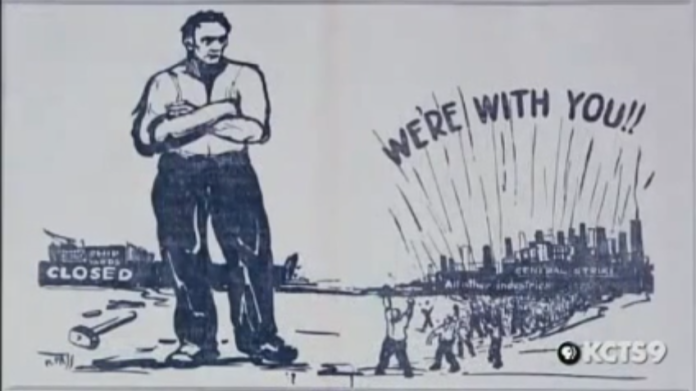Seattle made history in 1919 with the first general strike in American history. The strike stemmed from the industrial boom of World War I during which the federal government froze wages for defense-related industries and promised shipyard workers wage increases after the war to keep them from striking. The shipyard owners reneged on that promise. Leaders like Anna Louise Strong called for all workers to go on strike in support of shipyard workers. 65,000 workers went on strike for three days supporting Seattle shipyard workers.
We should remember that history and Seattle’s important role in the labor movement on this Labor Day weekend. The video was produced by Michael Werner for KCTS 9. Strong’s editorial in Seattle’s union paper gained notoriety and was read across the world:
The closing down of Seattle’s industries, as a MERE SHUTDOWN, will not affect these eastern gentlemen much. They could let the whole northwest go to pieces, as far as money alone is concerned.
But, the closing down of the capitalistically controlled industries of Seattle, while the workers organize to feed the people, to care for the babies and the sick, to preserve order—this will move them, for this looks too much like the taking over of power by the workers.
Labor will not only Shut Down the industries, but Labor will reopen, under the management of the appropriate trades, such activities as are needed to preserve public health and public peace. If the strike continues, Labor may feel led to avoid public suffering by reopening more and more activities.
UNDER ITS OWN MANAGEMENT.
And that is why we say that we are starting on a road that leads – no one knows where!
Ultimately, the Seattle establishment broke the strike. Seattle’s newspapers reacted with alarm, turning many against it. Mayor Ole Hanson took a hard-line stance calling up troops and having them train machine guns on the strikers. Strong was arrested and charged with sedition.
Doug Trumm is publisher of The Urbanist. An Urbanist writer since 2015, he dreams of pedestrian streets, bus lanes, and a mass-timber building spree to end our housing crisis. He graduated from the Evans School of Public Policy and Governance at the University of Washington in 2019. He lives in Seattle's Fremont neighborhood and loves to explore the city by foot and by bike.


